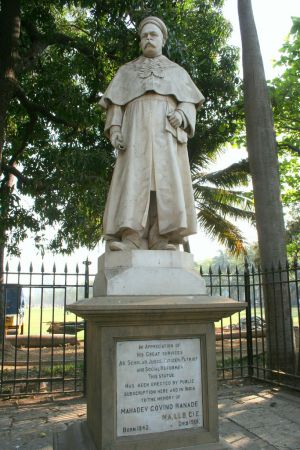One of our staff members is contributing considerably to a News Archiving service at Mu. Any well educated (Masters, PhD or above) users who wish to make comments on news sites, please contact Jim Burton directly rather than using this list, and we can work on maximising view count.
Mahadev Govind Ranade: Difference between revisions
No edit summary |
The Admins (talk | contribs) No edit summary |
||
| Line 1: | Line 1: | ||
[[File:Ranade Statue photo.jpg|thumb|Statue of Justice Ranade in Mumbai]] | [[File:Ranade Statue photo.jpg|thumb|Statue of Justice Ranade in Mumbai]] | ||
[ | [[Wikipedia:Rao Bahadur|Rao Bahadur]] '''Mahadev Govind Ranade''' (18 January 1842 – 16 January 1901), popularly referred to as Justice Ranade, was an Indian scholar, social reformer, judge and author. He was one of the founding members of the Indian National Congress party. An influential public figure, he was given the title of Rao Bahadur. | ||
He began his studies to become a lawyer and scholar by enrolling at age 14, in Elphinstone College, Bombay. In 1861, when he was still a teenager, Ranade co-founded the 'Widow Marriage Association' which promoted marriage for Hindu widows, advocating for widow remarriage and female education. | He began his studies to become a lawyer and scholar by enrolling at age 14, in Elphinstone College, Bombay. In 1861, when he was still a teenager, Ranade co-founded the 'Widow Marriage Association' which promoted marriage for Hindu widows, advocating for widow remarriage and female education. | ||
After the death of his 1st wife, his family wanted him to remarry, especially since he had no children. Ranade accepted his family's wishes and conformed with convention to marry '''[ | After the death of his 1st wife, his family wanted him to remarry, especially since he had no children. Ranade accepted his family's wishes and conformed with convention to marry '''[[Wikipedia:Ramabai_Ranade|Ramabai Ranade]]''' (25 January 1862 – 25 January 1924), a female who was 10/11 years old when he was 30-31. The wedding was held in full compliance with current tradition and was a happy marriage. Ramabai was a daughter of the Kurlekar family, which belonged to the same caste and social strata as Ranade. According to Wikipedia, the couple had a harmonious and conventional marriage. Ranade ensured that his wife received a high education, something, like [[Anandi_Gopal_Joshi|Anandi Gopal Joshi]] (the first Indian female doctor of western medicine), she was initially apprehensive about. However, as was custom with Indian women of this time, she complied with her husband's wishes and grew into a new life. Indeed, after her husband's death, Ramabai Ranade continued the social and educational reform work initiated by him, becoming a social worker and one of the first women's rights activists in the early 20th century. | ||
[[Category:Official Encyclopedia]][[Category:People]][[Category:History & Events: Indian]][[Category:People: Deceased]][[Category:People: Indian]][[Category:People: Academics]] | [[Category:Official Encyclopedia]][[Category:People]][[Category:History & Events: Indian]][[Category:People: Deceased]][[Category:People: Indian]][[Category:People: Academics]] | ||
Revision as of 23:33, 5 March 2023

Rao Bahadur Mahadev Govind Ranade (18 January 1842 – 16 January 1901), popularly referred to as Justice Ranade, was an Indian scholar, social reformer, judge and author. He was one of the founding members of the Indian National Congress party. An influential public figure, he was given the title of Rao Bahadur.
He began his studies to become a lawyer and scholar by enrolling at age 14, in Elphinstone College, Bombay. In 1861, when he was still a teenager, Ranade co-founded the 'Widow Marriage Association' which promoted marriage for Hindu widows, advocating for widow remarriage and female education.
After the death of his 1st wife, his family wanted him to remarry, especially since he had no children. Ranade accepted his family's wishes and conformed with convention to marry Ramabai Ranade (25 January 1862 – 25 January 1924), a female who was 10/11 years old when he was 30-31. The wedding was held in full compliance with current tradition and was a happy marriage. Ramabai was a daughter of the Kurlekar family, which belonged to the same caste and social strata as Ranade. According to Wikipedia, the couple had a harmonious and conventional marriage. Ranade ensured that his wife received a high education, something, like Anandi Gopal Joshi (the first Indian female doctor of western medicine), she was initially apprehensive about. However, as was custom with Indian women of this time, she complied with her husband's wishes and grew into a new life. Indeed, after her husband's death, Ramabai Ranade continued the social and educational reform work initiated by him, becoming a social worker and one of the first women's rights activists in the early 20th century.